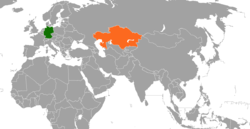Economic relations
Over 1450 companies with German capital, including joint ventures, representations of German companies and banks, are registered in Kazakhstan. [5] Over 900 German enterprises actively operate in Kazakhstan, including Heidelberg Cement, Daimler, Volkswagen, MAN, Siemens, Knauf, RWE, Bayer, BASF, Bosch, METRO, etc. [5]
Germany was one of the first countries to extend export credits under a bilateral arrangement to Kazakhstan in 1992 to support German manufacturers and modernize Kazakhstan's market economy. [6] Bilateral trade between the two countries amounted to EUR 4 billion in 2016. [1] The trade turnover between Kazakhstan and Germany, which experienced a decline in 2014-2016 due to the economic crisis, almost reached its pre-crisis level in 2017. The total trade between Kazakhstan and Germany in 2017 amounted to 4 billion 856 million euros, which is 81.3% of Germany's trade turnover with the Central Asian countries. [5]
A large part of foreign investments in Kazakhstan originates from Germany. Foreign direct investments (FDI) to Kazakhstan from Germany exceeded $183 million in 2018. The FDI were directed mainly into trade, industry and renewable energy. [7]
State Visits
German chancellor Angela Merkel visited Kazakhstan in 2010 where she met with President Nursultan Nazarbayev to commence a 'more dynamic partnership' with Kazakhstan. [9] Merkel laid a wreath at the Otan Qorgaushylar Monument, [9] an Astana monument to the fallen soldiers of the Great Patriotic War (the Eastern Front of World War II).
German president Frank-Walter Steinmeier noted in a July 2017 visit to Astana that German-Kazakh relations had grown closer and broader over the past 25 years. [10] The German president conducted his visit to participate in the National Day of Germany at the EXPO-2017. During his visit, the German president met with his Kazakh counterpart Nursultan Nazarbayev to discuss the countries' cooperation in economy, technology and education. [5]
This page is based on this
Wikipedia article Text is available under the
CC BY-SA 4.0 license; additional terms may apply.
Images, videos and audio are available under their respective licenses.



